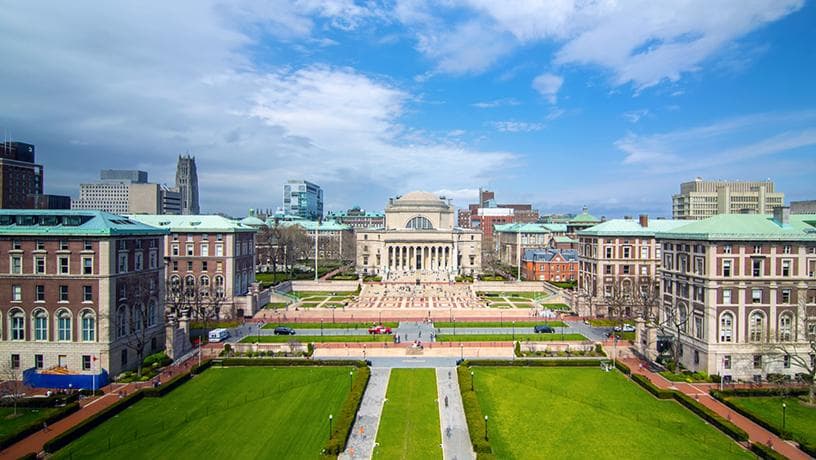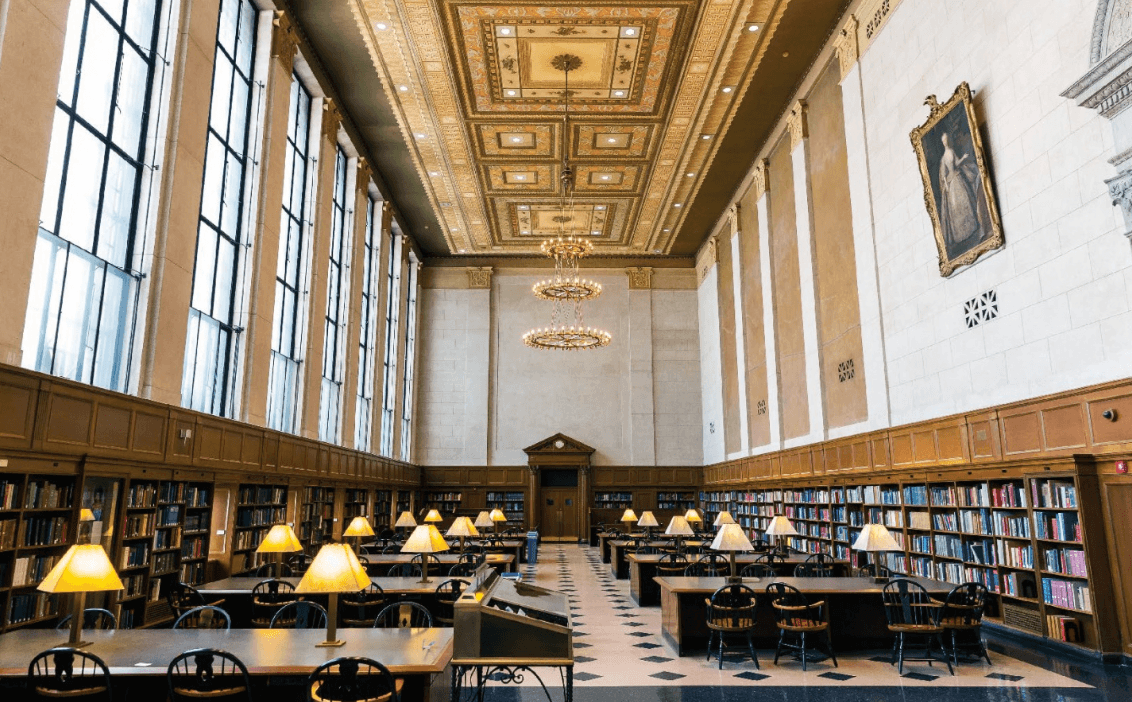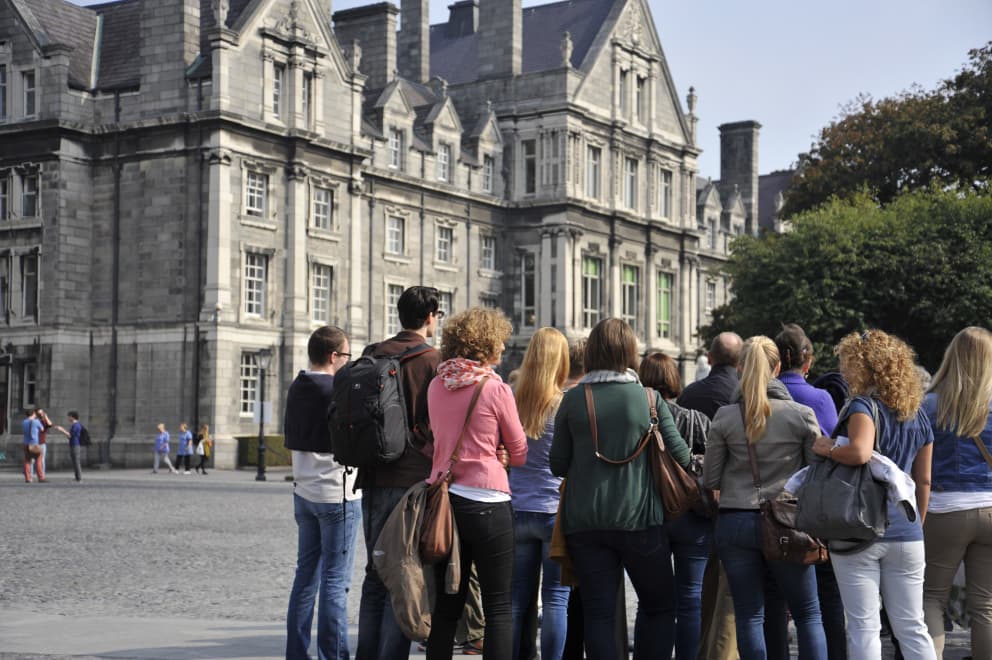What Is Columbia Known For?

Summary
Columbia University offers a distinctive undergraduate experience through its Core Curriculum, which all students complete and which emphasizes interdisciplinary learning across literature, philosophy, history, science, and the arts. While majors are optional, students can choose concentrations or majors to explore specific interests. Beyond academics, Columbia students engage in rich campus life, including over 500 clubs, traditions like the Varsity Show and Bacchanal, and unique opportunities in dining and New York City.
Columbia’s Academic Offerings: Majors + Core Curriculum
Remember how Columbia’a doesn’t require students to graduate with a major? Let’s dive into the specifics of Columbia’s unique and famous curriculum.
First, here is an overview of the schools that make up Columbia’s undergraduate experience.
Columbia’s Undergraduate Schools
Columbia undergraduate population is divided into two main schools:
- Columbia College
- The larger of the two undergraduate schools
- Home of the Core Curriculum.
- The School of Engineering and Applied Science
- Combines the benefits of a small program with the extensive resources of a major research university.
- Offers a blend of engineering, applied science, humanities courses, hands-on projects, and faculty-mentored research.
Within both of the undergraduate programs, students complete Columbia’s one-of-a-kind “Core Curriculum.”
The Core Curriculum: Columbia’s Pride and Joy
You probably have heard the terms “core curriculum” and “required courses,” but did you know that Columbia is home to the original, most famous Core Curriculum?
All students who graduate from Columbia must successfully complete the core Curriculum to graduate — this is no easy task. The Core Curriculum takes up well over half of all the classes students take at Columbia.
The Core Curriculum’s foundational principles are considered “intellectually expansive” and “personally transformative.” One of the distinct features of the Core is that it bridges the gaps between disciplines. It introduces cornerstone ideas and theories across literature, philosophy, history, science, and the arts. In turn, it encourages creativity, reflection, critique, and conversation for all students.
Students work with their peers to study some of the most profound texts that enlighten today’s understanding of the world and its progress. From Homer to Toni Morrison, Plato to Ghandi, Raphael to Andy Warhol, and the composers of Gregorian Chants to pop icon Taylor Swift, the Core Curriculum engages students with timeless works.
The main goal of the Core Curriculum is to grapple with the joys and trials of what it means to be human.
Take a look at an overview of the components that make up the Core Curriculum. Note: Students enrolled in the School of Engineering may not be required to complete all sections of the Core Curriculum
Columbia University's Core Curriculum
| Core Class | Description | Length |
|---|---|---|
| Literature Humanities | Taught by members of the Departments of Classics; English and Comparative Literature; French; German; Italian; Middle Eastern, South Asian, and African Studies; Philosophy; Religion; Slavic Languages; and Latin American and Iberian Cultures; as well as members of the Society of Fellows. Major works by over twenty authors, ranging in time, theme, and genre, from Homer to Virginia Woolf. Students are expected to write at least two papers, to complete two examinations each semester, and to participate actively in class discussions. | 2 Semesters |
| Frontiers of Science | The principal objectives of Frontiers of Science are to engage students in the process of discovery by exploring topics at the forefront of science and to inculcate or reinforce the specific habits of mind that inform a scientific perspective on the world. Sample topics include the brain and behavior, global climate change, relativity, and biodiversity, among others. Taught by members of natural science departments and Columbia Science Fellows. | 1 Semester |
| University Writing | Seminar is designed to facilitate students’ entry into the intellectual life of the university by teaching them to become more capable and independent academic readers and writers. The course emphasizes habits of mind and skills that foster students’ capacities for critical analysis, argument, revision, collaboration, meta-cognition, and research. Students read and discuss essays from a number of fields, complete regular informal reading and writing exercises, compose several longer essays, and devise a research-based project of their own design. | 1 Semester |
| Contemporary Civilizations | Taught by members of the Departments of Anthropology, Classics, English and Comparative Literature, French, German, History, Latin American and Iberian Cultures, Middle Eastern, South Asian, and African Studies, Philosophy, Political Science, Religion, Slavic Languages, and Sociology; and members of the Society of Fellows. A study in their historical context of major contributions to the intellectual traditions that underpin contemporary civilization. Emphasis is on the history of political, social, and philosophical thought. Students are expected to write at least three papers to complete two examinations, and to participate actively in class discussions. | 2 Semesters |
| Art Humanities | Discussion and analysis of the artistic qualities and significance of selected works of painting, sculpture, and architecture from the Parthenon in Athens to works of the 20th century. | 1 Semester |
| Masterpieces of Western Music | Analysis and discussion of representative works from the Middle Ages to the present. | 1 Semester |
| Science Requirement | Students choose from a catalog of over 100 course offerings including: Physics for Poets, Astronomy, Life in the Universe, Food and The Body, Environmental Disasters, and more. | 2 Semesters |
| Global Core Requirement | Students choose from a catalog of over 500 course offerings including: Japanese Manga, Ancient Empires, Latin Music, and more. | 2 Semesters |
| Foreign Language | Students must pass the Intermediate II level in one language. There are over 40 languages taught including: Swedish, Hebrew, Punjabi, Bengali, and more. | ~4 Semesters (Intermediate II - Students may take fewer semesters if they test out of elementary levels) |
| Physical Education + Swim Test | Students choose from a catalog of over 100 course offerings including: Fencing, Yoga, Rowing, Pilates, and more! Students must also pass a swim test to graduate. | 2 Semesters |
Yes, you read that correctly. You do in fact have to pass a swim test to graduate!
Simply put, the Core Curriculum sets you up for success in academia and life. From debating iconic Greek philosophers, to uncovering mysteries of Ancient Empires - the Core Curriculum inspires all minds.
Columbia Fast Fact: Did you know that Columbia students read on average over 1,000 pages a week? Don’t let this scare you. You may find yourself wanting to read even more.
What Is a Columbia Concentration?
Due to the size of the Core Curriculum and the breadth of topics covered, Columbia believes that the Core alone prepares students to enter the world. As a result, Columbia students are not required to complete a full major to graduate. Instead, they can opt to take a concentration or two.
A Columbia Concentration is similar to other universities’ minors. It is a smaller set of course requirements in one field of study.
For example, students interested in Psychology can complete the 11+ class major or the 7 class concentration.
The purpose of the Columbia Concentration is to grant students more time to be able to explore various fields of study.
One may choose to supplement the Core Curriculum with concentrations in Public Health and Theatre or a major in Philosophy and a concentration in Applied Mathematics. If you wish to study Engineering and Theatre at the same time — you can.
Columbia Majors + Unforgettable Classes
Outside of the Core, there are so many diverse interests among the student body that “Top Majors” are not highly relevant. The number of students enrolled in each major are set apart by a marginal number, so it wouldn’t be right to characterize slightly larger majors as “Top Majors.”
There are over 80 distinct fields of study beyond the Core, so students are engaging with material that aligns with their passions, whether they be niche fields or popular lines of research. Many students apply undecided to Columbia or end up changing their major after being accepted.
Here are some of the classes students never forget after graduating:
Columbia Classes Students Never Forget
| Course | Description | Department(s) |
|---|---|---|
| Witches | Explore the history of the word “witch” in the context of social witchcraft and modern day politics. | Creative Writing & Political Science |
| Political Journalism on the Campaign Trail | Immersive yourself in the world of campaign journalism with leading political analysts from The New York Times. This course is only taught during election years to be able to complete practical assignments and shadowing. | Journalism (alongside The New York Times) |
| Game of Thrones: Epics and Empires | Unpack the historical influences behind “Game of Thrones” and how epic literature informs the creation of the fictional worlds by R.R. Martin. | English |
| American Graphic Novels and Comics | Focus on the evolution of American comics and how illustrators and writers come together to create the household works everyone knows. | American Studies |
| Physics for Poets | Designed for non-STEM majors, physics is made accessible by discussing principles in relation to everyday experiences. | Physics & Mathematics |
| Introduction to Linguistics | Learn how language evolves overtime by solving weekly puzzles. Listen carefully you may hear some familiar cartoon voices teaching your lecture. | Linguistics |
| Psychology of Creativity (The Toddler Center) | Combining theoretical study with hands-on experience, work directly with toddler’s at The Toddler Center to observe behavior and learn how creativity can be nurtured. | Psychology |
Columbia Alumni: Once a Lion, Always a Lion
Columbia’s extensive history has produced an impressive list of alumni. The beautiful thing about the Columbia community is that everyone is connected by the Core Curriculum. All graduates have read the same books for over 100 years! So put two Columbia Lions in a room and they are equipped to talk for hours about the canon. While some books have been updated, the Canon of Literature continues to grow. Current students have a running debate on whether past alumni really did all of the required reading.
Which of the following alumni do you think did all of their required reading?
- President Obama (CC’83) - 44th President of the United States whose time at Columbia played a significant role in shaping his political views and future career in public service.
- Ruth Bader Ginsburg (CL’59) - Supreme Court Justice who is remembered for her fight for reproductive and equal rights. She also graduated first in her class at Columbia.
- Richard Rodgers (CC’23) and Oscar Hammerstein (CC’16) - Legendary musical theater composer and lyricist duo. Wrote countless shows including: “The Sound of Music,” “Oklahoma!,” and “Cinderella.”
- Poppy Harlow (CC’05) - CNN Newsroom anchor and political journalist. Known for her coverage of breaking news.
- Alexander Hamilton (King’s College) - One of the Founding Fathers of the U.S. and first Secretary of the Treasury. And of course, the inspiration for the smash-hit Broadway musical “Hamilton.”
- Kate McKinnon (CC’06) - A comedian legend and actress known for her work on “Saturday Night Live.” While at Columbia she participated in The Varsity Show.
Columbia’s History: King’s College to the Present Day
Take a look over the 270 year history of Columbia University and its relation to the founding of America.
1754 - King’s College is charted by King George II and the first classes are held.
1775 - The American Revolution begins and classes are suspended to allow students to fight for the cause.
1784 - King’s College is renamed Columbia College.
1825 - The Alumni Association of Columbia is Founded.
1860 - Intercollegiate sports begin.
1877 - The Columbia Daily Spectator is first printed.
1894 - The very first Varsity Show takes place. What began as an athletics fundraiser has gone on to become a satirical musical extravaganza!
1919 - The Columbia Curriculum is changed for the 4th time, and this would become the Core Curriculum.
1941 - Research begins on the atom, and WKCR Student Radio begins broadcasting.
1948 - Eisenhower becomes President of Columbia.
1968 - Students occupy buildings on campus to protest the Vietnam War.
2002 - Lee C. Bollinger begins his 22 year tenure as President of Columbia University.
2008 - Barack Obama CC ‘83 is elected President of the United States.
2020 - Columbia cancels its first graduating ceremony in history due to the pandemic.
2023 - Columbia elects Minouche Shafik as the first female President.
2024 - Columbia students occupy campus buildings in light of the humanitarian crisis in the Middle East, reflecting that of the Vietnam War Student Protests.
Columbia’s Campus Life: Lions in the Big Apple
With its connection to West Harlem, Columbia’s campus is rich in cultural and political history. Over the years, Columbia has been — and remains — the epicenter for political activism that goes on to inspire movements all across the country. The success of protests and calls for change all would have failed if it weren’t for the students. Every year, students gather on College Walk to debate topics, march in solidarity, and relish the history of all Columbia Lions that came before them. This is the Columbia Community.
Columbia’s campus houses many famous landmarks that have been captured in Hollywood films, news coverage, student selfies, and of course young students posing in front of Alma Mater hoping to get accepted to the Ivy League. Commonly visited sites include: Low Steps, Butler Library, The Thinker Statue, and The Sundial.


Columbia Fast Fact: One other landmark that many people don’t get the chance to see in person is Havemeyer 309. More commonly known as the most filmed classroom in Hollywood. Films and TV shows including “Ghostbusters,” ‘West Side Story,” “Spiderman,” and “The Marvelous Mrs. Maisel.” If you are lucky enough to have class in 309, it may be canceled because of ongoing film shoots.
Being in the heart of New York City, you surely will not run out of things to do. This is even true within the gates of Columbia. With over 500 student clubs and organizations, students at Columbia know how to get involved and stay active. The running stereotype about Columbia students is that they never rest.
Here is a quick look at some of the campus offerings:
- WKCR: Columbia’s student-run radio station that has been broadcasting since 1941.
- Columbia Daily Spectator: Columbia’s independent student newspaper that provides in-depth coverage of campus events and issues since 1877.
- Society of Women Engineers: A group dedicated to empowering female engineering students. They offer professional development and community outreach programming.
- Columbia Pops: Student-run orchestra that performs multiple genres of music including video game scores, pop music, and Broadway musicals .
- The Federalist: Commonly known as The Feds. This is Columbia’s satire newspaper that provides humor for the events that take place on campus.
- CU Records: Columbia’s student-run recording studio offering resources for aspiring musicians and producers.
- Columbia Musical Theatre Society: Columbia’s student-run theater group dedicated to staging hit musical revivals.
Columbia Fast Fact: Every Columbia student gets free access to almost every museum in NYC for free! This is not true about all schools in NYC. Columbia believes learning doesn’t just occur in the classroom.
Traditions the Columbia Way
Traditions on Columbia’s campus are abundant thanks to the numerous clubs and organizations. Take a look over a handful of Columbia traditions, and decide which ones you would attend.
Columbia Traditions:
- Tree Lighting - Annual festive event to watch the lighting of the trees on College Walk. There are live performances and hot chocolate.
- Tip: Get there early if you want a souvenir holiday mug.
- Glass House Rocks - Lerner Hall, recognized for its glass walls, becomes a multi-floor dance party with food and games.
- NSOP - Week-long events welcoming new students with tours of the city, workshops, and events to get to know other Columbia freshmen.
- Bacchanal - Annual spring concert on Low Steps featuring popular artists.
- The Varsity Show - Student-written and produced musical comedy satirizing Columbia life.
- Battle of the Dining Halls - Culinary competition where dining halls compete and students vote.
- World Leaders Forum - Annual event hosting global leaders for discussing pressing issues.
- Urban Lottery - Students enter year round lotteries for free tickets to Broadway shows, concerts, dance performances, movie screenings, and more.
- Protest - Daily event that upholds the long-standing tradition of student activism to advocate for social justice and change.
Columbia Dining: The Best of the Best
Yes, even Columbia’s Dining services are notable. They consecutively rank in the top of dining services for all universities in the U.S.. With over 14 dining locations, students never go hungry.
Columbia Dining Highlights:
- Each year dozens of famous chefs come to Columbia to cook specialty dishes for students followed by a “Meet and Greet and Eat.”
- One of Columbia’s dining halls, JJ’s, is open nearly 24 hours a day. Perfect for late night study snacks like 3:00 AM pancakes.
- Chef Mike, the head chef of John Jay Dining Hall and campus celebrity, made famous by Columbia Dining’s Instagram greet students with coveted Chef Mike merchandise.
Wondering How To Stand Out to Columbia Admissions Officers?
Columbia seeks students who have defined aspirations, are up-to-date with global issues, and are eager to join the history of student activism. With its home in New York City, the admissions committees look to accept students who wish to engage with both the Columbia and New York City communities.
To stand out in the admissions process, it’s critical to show intellectual curiosity, develop a compelling narrative in your essays, and demonstrate a commitment to excellence in your academic pursuits.
Final Thoughts
Columbia’s application process is challenging. But with Crimson’s expert guidance, you’re set up for success.
Crimson students increase their odds of getting into top schools like Columbia by 7x times. Check out our independently verified student results to see for yourself.
Our unique strategy for success combines a team approach, personalization, and an outstanding bench of talented and dedicated college admissions consultants. Whether you're looking to bolster your extracurricular profile by adding a capstone project, write out a powerful essay, or ensure you don’t make a common mistake on the application — our team is ready for you!
- To get to know us better, join some of our upcoming consultant-led webinars and events and learn more about Crimson's story and its unrivaled commitment to helping students around the world access transformative educational opportunities.
- For personalized feedback and discussing what kind of tailored approach best fits your circumstances, reach out today for a free consultation with a friendly Crimson expert.


